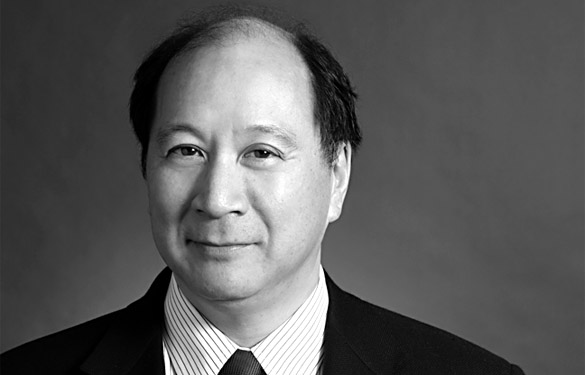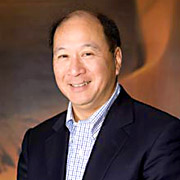Profile | Kenneth Wang '71

"There are a couple things in life that everyone should spend some
time with, and Shakespeare is one of them. He is good for the soul.
And there are many lessons to be learned from Shakespeare..."
SEPTEMBER 2010
KENNETH WANG, MEMBER OF THE MIT CORPORATION, and 2009-2010 president of the MIT Alumni Association, has observed the Institute closely for more than forty years. He recalls that, when he first walked onto campus in the fall of 1967, “there was still some Eisenhower in the air.”
But the cultural earthquakes that were ripping through the country soon reached the Institute campus. By Wang’s sophomore year, Cambridge had become a center of political activity and new ideas were sweeping through MIT’s corridors. It is a time Wang remembers with great fondness, and he cites the period’s upheavals as important influences on his worldview and perspective.
During that era, Wang took classes from some of the country’s best minds, including economists Paul Samuelson and Bob Solow. “Nobel prize winners are different than you and me,” he says. “When they speak it’s really, really humbling.” What also dazzled Wang about the Nobel laureates was that they were polymaths, whose “range of interests, intellect, experience, and knowledge went way beyond their field.”
Course XIV
Ken majored in Course XIV, and has remained extraordinarily committed to the Economics Department—as a major donor, Visiting Committee member (2005-2009), event host, and as a volunteer leader of a recent campaign to build the department’s endowment.
Professor James Poterba, who served as Economics Head during the recent two and a half year campaign speaks of Wang with pleasure, saying, "Ken is one of the Economics Department's most active graduates. He has celebrated the accomplishments of our students and faculty, provided wisdom and guidance for our long-term planning, and shared his time and treasure to create a stable financial base for the department's future. It is a delight to work with him.”

Wang, who majored in Course XIV, is one of the Economics Department's most active graduates, sharing his wisdom, time, and treasure on behalf of the department's future.
Wisdom
While studying economics, Wang was also strongly influenced by remarkable classes in political science and literature, and today, focuses some of his philanthropic support on MIT programs that help broaden and give perspective to engineering and science educations—specifically, he has been regularly supporting Shakespeare-focused projects and classes in the School of Humanities, Arts, and Social Sciences.
For example, last year Wang supported an ambitious production that blended the MIT Symphony Orchestra’s performance of Felix Mendelssohn’s music for “A Midsummer’s Night Dream” with student actors performing scenes from the play, and the Women's Chorus (select members of the MIT Concert Choir & Chamber Chorus) singing selections of Mendelssohn’s work.
He also made possible a theater class on the Roman political setting of “Julius Caesar” and its parallel in an American electoral setting, and has helped Literature Professor Peter Donaldson add key films of Asian Shakespeare productions to the MIT Shakespeare Electronic Archive, an archive of electronic environments for Shakespearean teaching and research.

Wang, who also supports many Shakespeare projects, made possible an ambitious music and theater production of Mendelssohn's music for "A Midsummer Night's Dream," and an illuminating class on the Roman political setting of “Julius Caesar” and its parallel in an American electoral setting.
“There are a couple things in life that everyone should spend some time with,” Ken says, “and Shakespeare is one of them.” Wang believes MIT students greatly benefit from encounters with Shakespeare’s language and wisdom. “In the real world,” he reflects, “people are not impressed with your logic only. There are many lessons to be learned from Shakespeare—about how to get along with people, how to evaluate the world, and how to be persuasive.”
Professor of Theater Arts Janet Sonenberg applauds Wang’s insight, recalling how he once told her that he supports Shakespeare projects because “I think Shakespeare is good for the soul.” She adds, “Given the humanity of the plays, you really can’t argue that point.”
Commitment
In coming to MIT, Ken was following in the footsteps of his father, Cheng C. Wang, who graduated in 1946, and along with three other MIT graduates, founded the venture merchant company US Summit.
After MIT, Ken earned an MBA at Harvard Business School, and in 1980 joined US Summit, becoming president in 1996. Today, the company, which focuses on enterprises ranging from ethical pharmaceuticals to children’s products, has more than 1,000 employees, from New York to Taiwan, Hong Kong, China, and Vietnam.
Over the years, Wang has become increasingly active in MIT activities, including a tour as president of the MIT Club of New York. The deep and ongoing gratitude of the Institute community for Ken's vision and commitment is reflected in several awards presented to him, including a Henry B. Kane '24 Award for fundraising, and a Harold E. Lobdell '17 Distinguished Service Award.
Last year, as Ken assumed the President's role for the MIT Alumni Association, he reflected on the rewards of his engagement with the Institute. "Simply put," he said, "it makes one feel good to contribute, and particularly to a cause as worthy as MIT. It is a wonderfully pure place—ecumenical, fair, and committed to making things better."
He added, "As we get older, we tend to turn to sources of constancy, confidence, and caring. In a highly changeable world, MIT is actually a pretty good source for all three." •

Support for the School
To learn about giving to the School, contact Anne Marie Michel,
Assistant Dean for Development. 617.253.4075 | ammichel@mit.edu
Story prepared by SHASS Communications
Editorial and Design Director: Emily Hiestand
Writers: Stephanie Schorow, Anne Marie Michel, Emily Hiestand
Images: Middle row: Ricardo Caballero with 2009 economics graduates;
Lower row: detail, Shakespeare portrait; detail, from engraving of poster
for "Julius Casear," by E. Scriven, The Boydell Shakespeare Prints;
detail from poster for "A Midsummer Night's Dream"
Bottom: photograph of Kenneth Wang by Chris Brown